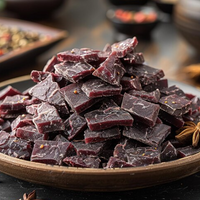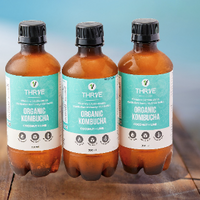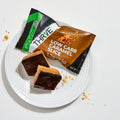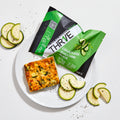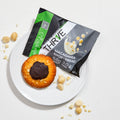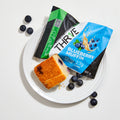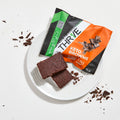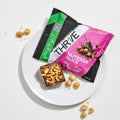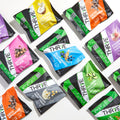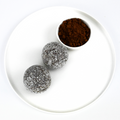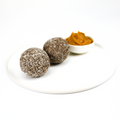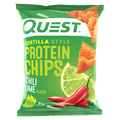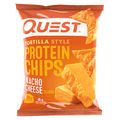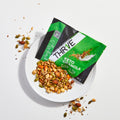Our THR1VE in-house nutritionist Shannon Young recently shared her advice for choosing a protein powder on Body & Soul. Check out her piece below!
 I have to admit I am an advocate for a diet of minimally-processed wholefoods. However, a protein powder made with quality ingredients can be a really useful addition to your diet.
I have to admit I am an advocate for a diet of minimally-processed wholefoods. However, a protein powder made with quality ingredients can be a really useful addition to your diet.
Supplementing with protein can help you reach specific goals, whether that’s losing or gaining weight, managing your weight or supporting an exercise program. Of course, over time your goals may change. You may start off wanting to shed a few kilos and then once you reach that milestone you might want to gain muscle. For this reason, I find it’s best to pick a protein that can adapt with you.
The nutritional information panel
To do this, the nutritional information panel will be your friend. For protein, you want to aim for about 25g per serve, especially if you’re training. For carbohydrates, aim for no more than 5g of carbs per serve. That way, you can add carbs depending on your activity level. For example, you could make a protein smoothie and add carbs like oats or banana if you’ve done an intensive workout.
Same goes for fat content – while you want plenty of good fats in your diet, I’d recommend a protein powder with about 5g of fat per serve. This is because fat slows the absorption of protein, whereas straight after training you usually want to absorb protein more quickly to get the benefits. Of course, you can then add extra fat in the form of MCT oil, avocado or nut butters, depending on your goals and when you’re consuming your protein.
A core protein source
You’ll also need to choose a core protein source. There’s a range of proteins on the market, including whey, pea, hemp, soy and rice. I tend to use either whey or hemp.
Hemp has a similar nutritional profile to egg white protein, making it a complete plant-based protein (i.e. it has all the essential amino acids). It’s a great option if you have an intolerance to dairy. If you’re clear from any dairy allergies, whey protein is popular because it is quickly digested, meaning it can go to work on muscle recovery right away. It’s also generally the cheaper out of the two. Comparatively, whey protein contains more protein per scoop than hemp, however, hemp contains heart-healthy unsaturated fats and fibre. Either is a great choice.
Ingredients
Be vigilant about your ingredients when purchasing a protein powder. Here’s a good way to judge it: if you have a hard time pronouncing most of the ingredients or if there’s a bunch of numbers in the list, be wary. I also would watch out for dextrin, glucose, gluten, artificial sweeteners, skim milk powders/milk solids, soy proteins, vegetable oils, thickeners and fillers. I know, it’s an extensive list. However, if you’re having protein regularly, I’d recommend avoiding these.
While there are ingredients you want to avoid, there’s plenty of functional ingredients that can be valuable additions to your protein powder. Once again, it really depends on your own needs. However, as a general guide, I find it’s useful to have some essential vitamins and minerals, a source of fatty acids and some kind of natural fat burner, like green coffee bean. Almost every protein is sweetened in some way – I tend to choose one with stevia as it’s the most natural sweetener available.
Functional ingredients are great but watch out for callouts on the packaging that promote “muscle growth” or “rapid weight loss”. Some companies will include a small trace amount of an ingredient proven to accelerate these benefits, but the amount they include in their product is not enough to make a significant difference. Plus, as you would be aware, muscle growth and weight loss are dependent on a range of factors beyond just the protein you consume.
Make a plan
Another factor to consider when choosing a protein powder is when you plan to consume it. If you delve deep into this subject, you’ll find several studies that contradict one another.
However, there are a few basic guidelines you can follow. Protein concentrate is absorbed at a moderate pace – it’s a good option to consume between meals if you workout at a time when you can consume a proper meal afterwards. Protein isolate is rapidly absorbed, great for 20-40 minutes after your workout. It’s a good option if you train in the morning or at lunch and are on the run. Isolate protein will transport amino acids into your muscles’ cells at a quick pace.
Casein has a longer digestion period, meaning it is a perfect option if you train later in the day because it will provide a constant flood of aminos throughout the night, while your body repairs and replenishes. If you’re mixing up your type of training, timing and days, finding a protein powder that contains all three of these will be the most beneficial.
Whether you need an energy boost post-workout or a balanced snack on the run, protein powder can be a nutritious addition to your diet. The key is finding quality ingredients that work for you – that will always be your best guide.
This piece originally appeared on Body & Soul – see the original story here.

